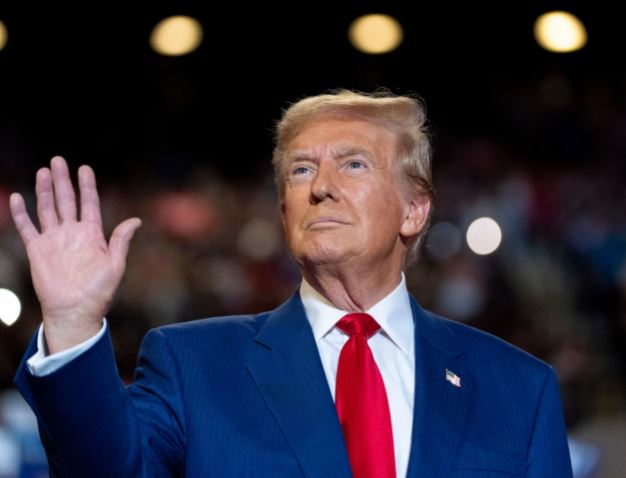By Levon Baronian
As the United States approaches a pivotal presidential election, the global community watches closely, anticipating shifts in international relations and policies. For Armenia and Artsakh, a victory for former President Donald Trump could bring significant geopolitical changes, particularly concerning regional security and the complex dynamics of the South Caucasus.
An Immediate Push to End the Ukraine-Russia War
One of the central factors to consider is that Trump is likely to advocate for an immediate resolution to the ongoing Ukraine-Russia conflict. During his previous tenure, Trump emphasized direct diplomacy and expressed a willingness to engage with Russia to resolve longstanding issues. An expedited end to the war would alleviate Russia’s military and economic burdens, allowing it to refocus attention on the Caucasus region.
With Russia less preoccupied on its western front, it could reassert its role as a stabilizing force in the South Caucasus. This shift would be particularly beneficial for Armenia, which has historically relied on Russian support to balance regional pressures from neighboring countries like Azerbaijan and Turkey. A thawing of Russian-American relations may itself benefit Armenia in a different way, by eliminating or minimizing the Western pressure on Armenia to distance itself from Russia’s orbit. Armenia’s western-induced stray from its historical relationship with Russia has had negative territorial repercussions, similar to what Georgia and Ukraine have experienced. Antagonize Russia and you end up paying for it with land, one way or another.
Reducing Russia’s Reliance on Turkey
Turkey, despite being NATO’s second-largest military power, has maintained a relatively neutral position regarding the Ukraine conflict. By keeping communication channels open with both Russia and Western nations, Turkey has increased its strategic importance to Russia amidst international sanctions. This dynamic has, in turn, elevated Turkey’s influence in regional affairs, sometimes to the detriment of Armenian interests.
An end to the Ukraine-Russia war would decrease Russia’s reliance on Turkey as an intermediary, potentially limiting Ankara’s leverage over Moscow. This reduction in Turkish influence could lead to a more balanced power dynamic in the South Caucasus, providing Armenia with a stronger position in regional negotiations and security matters.
Trump’s Explicit Support for “Artsakh”
In a recent statement, Trump condemned the “forcible displacement” of over 120,000 ethnic Armenians from Nagorno-Karabakh following Azerbaijan’s 2023 offensive. Notably, he referred to the region by its Armenian name, “Artsakh,” underscoring his recognition of Armenian historical and cultural ties to the territory. Trump stated:
“Kamala Harris did NOTHING as 120,000 Armenian Christians were horrifically persecuted and forcibly displaced in Artsakh. Christians around the World will not be safe if Kamala Harris is President of the United States.”
He further pledged:
“When I am President, I will protect persecuted Christians, I will work to stop the violence and ethnic cleansing, and we will restore PEACE between Armenia and Azerbaijan.”
Trump’s use of “Artsakh” is significant, as it aligns with Armenian nomenclature and acknowledges the deep-rooted connection Armenians have with the region. This choice of words indicates a level of understanding and empathy towards Armenian perspectives that could translate into more supportive U.S. policies.
Clarifying Military Aid to Azerbaijan
During Trump’s previous term, the U.S. increased military aid to Azerbaijan. While some critics view this as a factor that emboldened Azerbaijan’s actions against Armenia, it’s widely acknowledged that the aid was intended to bolster Azerbaijan’s capabilities against Iran, not Armenia. The geopolitical strategy focused on countering Iranian influence in the region and was not meant to disadvantage Armenia.
Understanding this context is crucial. It suggests that Trump’s administration did not intend to undermine Armenian security interests and that any military support to Azerbaijan was part of a broader strategy unrelated to the Armenia-Azerbaijan conflict.
Timing of the 2020 Artsakh War
The 2020 Nagorno-Karabakh war erupted in late September, just weeks before the U.S. presidential election. At that time, Trump was heavily engaged in a heated reelection campaign amidst domestic challenges, including the COVID-19 pandemic. It is reasonable to consider that his capacity to address an international crisis was constrained by pressing national concerns.
Moreover, some analysts suggest that Azerbaijan may have chosen this specific timing, anticipating limited international intervention due to global preoccupations. Therefore, accusing Trump of inaction during this period overlooks the complex circumstances and the strategic calculations of other regional actors.
The Role of Armenia’s Leadership
While a potential Trump presidency could create favorable external conditions for Armenia, internal factors are equally crucial. The current Armenian regime, led by the pro-Turkish Prime Minister Nikol Pashinyan, will need to be replaced to fully capitalize on the weakening of Turkey’s influence in the Caucasus. A leadership more attuned to leveraging these geopolitical shifts could enhance Armenia’s strategic positioning and security. However, the intricacies of Armenia’s internal politics and any potential changes in government are complex matters that extend beyond the scope of this discussion.
Strengthening Armenia’s Security Landscape
A Trump presidency could lead to a recalibrated U.S. foreign policy that prioritizes the protection of persecuted Christian communities, as indicated by his recent statements. This focus could result in increased diplomatic support for Armenia and greater pressure on Azerbaijan to adhere to international norms regarding human rights and territorial integrity.
With Russia potentially more engaged in the South Caucasus and less dependent on Turkey, Armenia could benefit from reinforced security guarantees. A more balanced regional power structure might deter aggressive actions and encourage peaceful negotiations.
Challenges and Considerations
While the potential benefits are noteworthy, it is important to approach this possibility with caution. The Armenian National Committee of America (ANCA) has urged for concrete actions rather than campaign promises. The ANCA has called on political leaders to deliver tangible results and policy commitments that genuinely support Armenia’s interests.
During his previous term, Trump’s administration faced criticism for increasing military aid to Azerbaijan. Although this aid was intended to counter Iran, some argue that it indirectly affected the regional balance. Therefore, it is crucial for any future administration to ensure that support for Armenia is consistent and effective, translating words into meaningful actions.
Economic Opportunities and Regional Development
The cessation of hostilities in Ukraine could also open avenues for economic collaboration in the Caucasus. Reduced tensions might facilitate infrastructure projects, such as the reopening of regional transportation routes and rail links. Armenia has estimated that constructing and restoring these connections could cost around $200 million—a significant investment that could boost the nation’s economy and enhance its role in Eurasian trade networks.
Navigating Complex Geopolitics
While there are potential benefits for Armenia if Trump wins the upcoming election, Armenia must approach this possible shift with strategic foresight. International relations are intricate, and positive developments in one area can lead to challenges in another. It is essential for Armenian leadership to engage proactively with all major powers, ensuring that national interests are advanced through diplomatic skill and balanced partnerships.
Conclusion
A Trump victory in the upcoming U.S. presidential election could offer Armenia several strategic advantages. By advocating for an immediate end to the Ukraine-Russia war, Trump could facilitate a regional realignment that strengthens Armenia’s security and diplomatic standing. His explicit support for Armenia, acknowledgment of “Artsakh,” and commitment to protecting persecuted Christians signal a potential shift toward more robust U.S. engagement on Armenian issues.
Understanding the nuances of past U.S. military aid to Azerbaijan and the timing of the 2020 Artsakh war provides a clearer picture of the geopolitical landscape. It highlights the importance of context when evaluating foreign policy decisions and their impacts.
Ultimately, the onus lies on Armenia to capitalize on these opportunities, should they arise. By maintaining vigilant and adaptable diplomacy, and potentially reassessing internal leadership to better align with new geopolitical realities, Armenia can work towards securing its national interests, promoting regional stability, and ensuring the well-being of its people in an ever-changing global environment.




